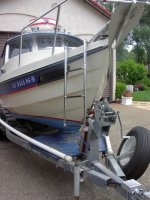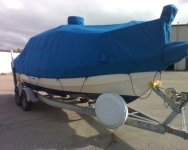tparrent
New member
- Joined
- Dec 23, 2009
- Messages
- 285
- Reaction score
- 0
- C Dory Year
- 2017
- C Dory Model
- 255 Tomcat
- Vessel Name
- Tomfoolery
As I need to replace my trailer tires, I guess I'm going to need a jack. I suppose if I plan to hit the road for any exploring I should have a decent jack in the truck for roadside misadventures anyway.
I thought I could just use my truck's scissor jack but I think it is designed to hook into a slot in the truck. If that's the case, what would you recommend for a trailer jack? I see there are compact floor jacks now but I don't know how much space they take up when stowed.
A jack won't do jack for me unless I have a spare tire. I do happen to have a spare but it was a real act against the laws of geometry trying to mount in on the trailer. I finally wrestled it onto the winch post but, for no good reason, all four bolts sheared off and sent the tire on its own vacation. DO you have any recommendations for how to mount the tire? I recall that finding a bracket that would fit was problematic because of the size of the winch post so any suggestions on that are appreciated!
Boating - it's never as simple as the pictures seem to indicate
Thanks!
I thought I could just use my truck's scissor jack but I think it is designed to hook into a slot in the truck. If that's the case, what would you recommend for a trailer jack? I see there are compact floor jacks now but I don't know how much space they take up when stowed.
A jack won't do jack for me unless I have a spare tire. I do happen to have a spare but it was a real act against the laws of geometry trying to mount in on the trailer. I finally wrestled it onto the winch post but, for no good reason, all four bolts sheared off and sent the tire on its own vacation. DO you have any recommendations for how to mount the tire? I recall that finding a bracket that would fit was problematic because of the size of the winch post so any suggestions on that are appreciated!
Boating - it's never as simple as the pictures seem to indicate
Thanks!


